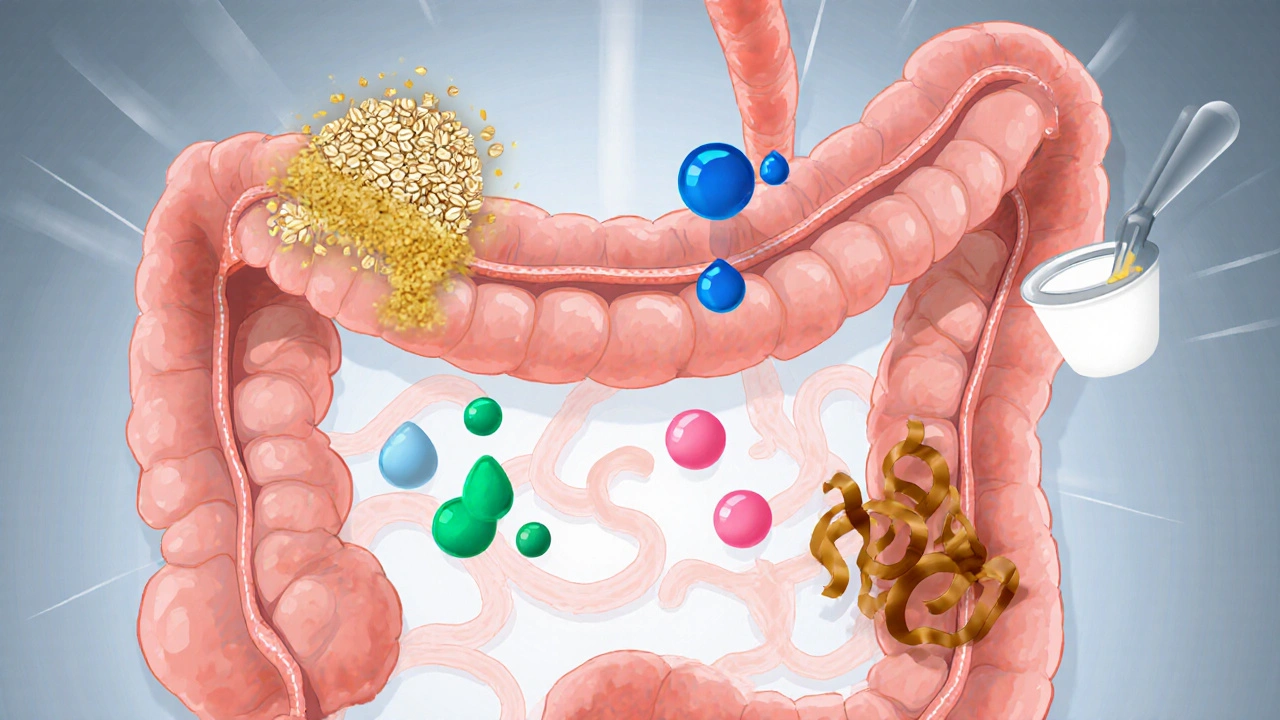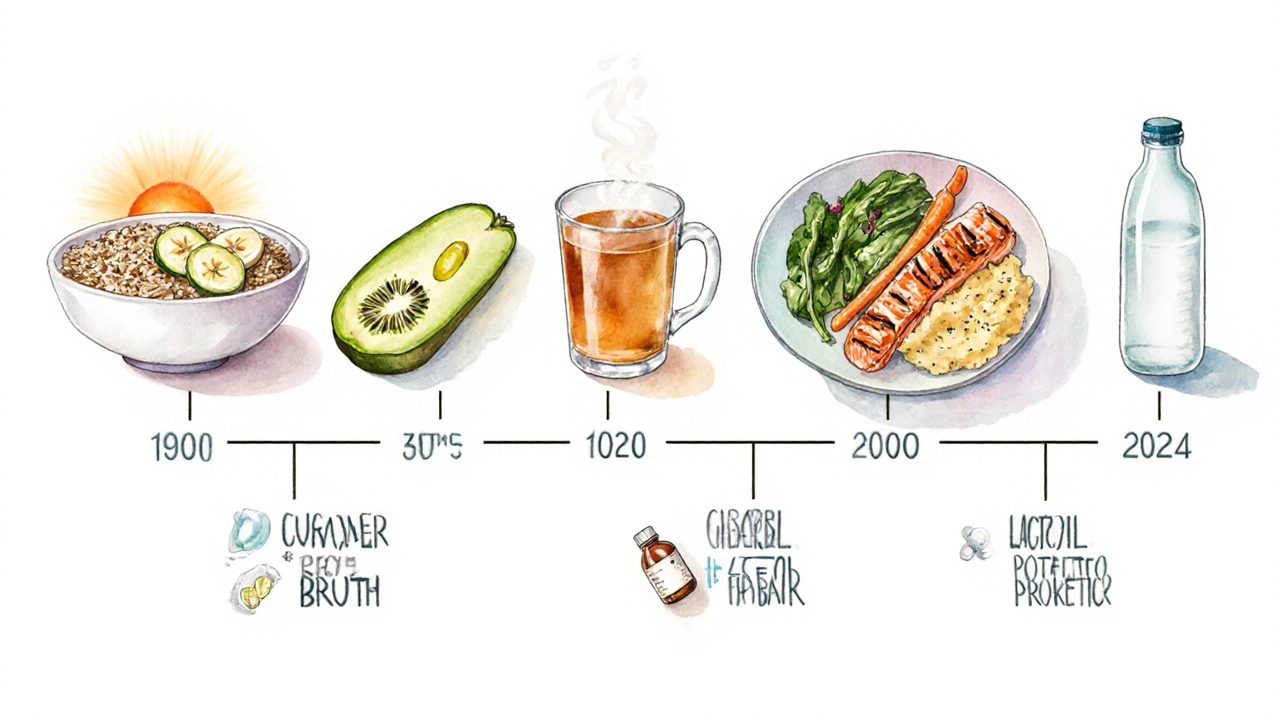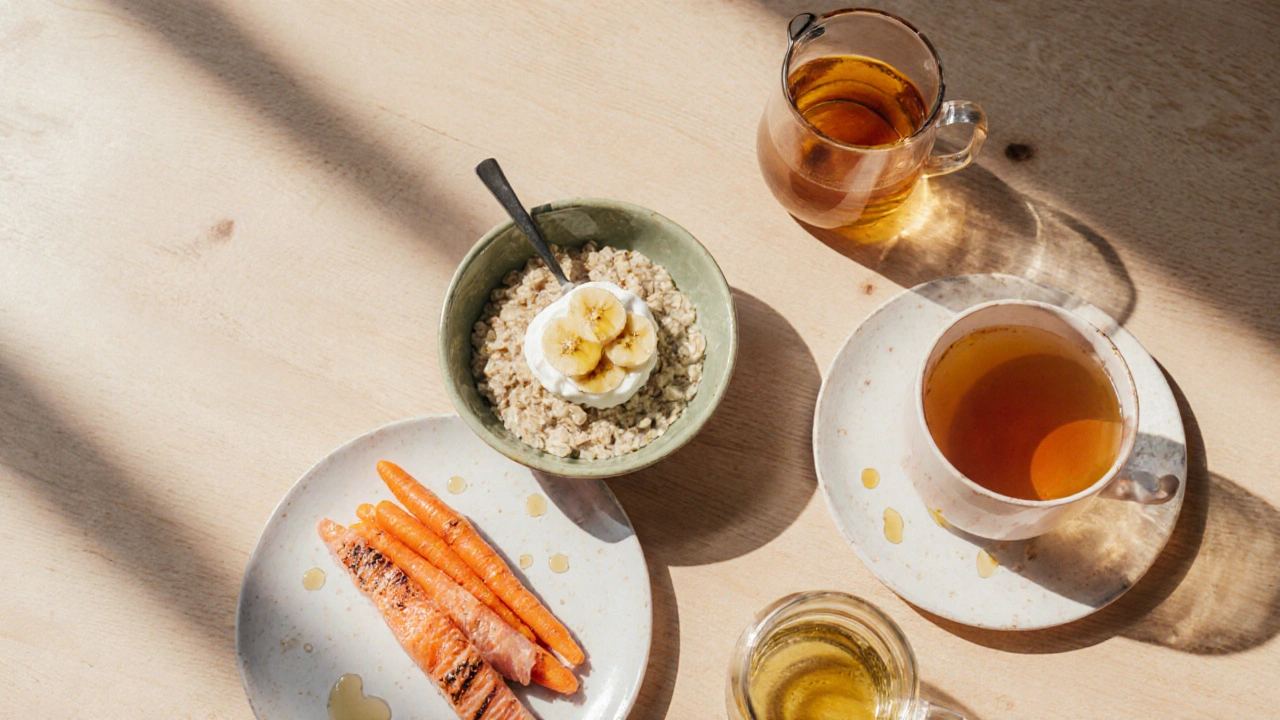Colitis Diet Food Checker
Select a food item above and click "Check Food Safety" to see if it's beneficial or problematic for your colitis management.
Colitis-Friendly Foods
Foods to Avoid
When it comes to managing Colitis is a chronic inflammation of the colon that causes abdominal pain, diarrhea, and fatigue. It belongs to the broader group of inflammatory bowel diseases (IBD) and affects millions worldwide. Nutrition can either calm the flare‑ups or make them worse, so knowing which foods to welcome and which to banish is crucial. Below you’ll find a roadmap that turns confusing diet advice into a clear, everyday plan.
Why Diet Matters for Colitis
Inflammation in the colon is fueled by three main factors: microbial imbalance, irritating compounds, and immune triggers. The foods you eat directly influence each of these. For example, a high‑fiber diet nurtures beneficial bacteria that produce short‑chain fatty acids, which Probiotic bacteria are live microorganisms that can restore gut balance. In contrast, excess processed sugars feed harmful microbes, worsening symptoms.
Research from the British Society of Gastroenterology (2023) shows that patients who followed a tailored low‑FODMAP or specific anti‑inflammatory diet reported a 30% reduction in daily stool frequency within eight weeks. That’s why a colitis diet isn’t just a suggestion-it’s a therapeutic tool.
Core Principles of a Colitis‑Friendly Diet
- Listen to your body: Keep a food‑symptom diary for at least two weeks. Note any rise in cramping, urgency, or bloating after meals.
- Choose low‑residue foods during flare‑ups: These are easier to digest and produce less stool bulk.
- Incorporate anti‑inflammatory nutrients: Omega‑3 fatty acids, antioxidants, and specific vitamins can dampen immune over‑reaction.
- Stay hydrated: Diarrhea can quickly deplete electrolytes; aim for 2-3 liters of fluid daily, preferably with a pinch of salt.
- Gradually re‑introduce fiber: When symptoms subside, add soluble fiber first, then slowly test insoluble sources.
Foods to Eat - The Good Guys
Below is a list of foods that consistently show benefits for colitis patients, supported by clinical data or strong mechanistic reasoning.
- Oatmeal - a soluble‑fiber powerhouse that forms a gel, easing stool consistency.
- Bananas - low‑FODMAP, rich in potassium, and coat the gut lining.
- Salmon - provides EPA and DHA, the two omega‑3s proven to lower intestinal inflammation.
- Greek yogurt - contains live cultures that act as probiotic agents, helping restore microbiome balance.
- Carrots (cooked) - soft, low‑FODMAP, and a source of beta‑carotene, an antioxidant that protects gut cells.
- Olive oil - rich in mono‑unsaturated fats and polyphenols, both anti‑inflammatory.
- Bone broth - supplies gelatin and collagen, which may help seal the intestinal lining.
Foods to Avoid - The Trouble Makers
These items are most often reported to trigger flare‑ups. They either contain high amounts of FODMAPs, irritants, or pro‑inflammatory fats.
- Wheat products - gluten can aggravate gut permeability in some colitis patients.
- Cruciferous vegetables (raw) - broccoli, cauliflower, and cabbage are high in raffinose, a FODMAP that fuels gas.
- Processed meats - contain nitrites and saturated fats that promote inflammation.
- Alcohol - damages the mucosal barrier and disrupts microbiota.
- Caffeinated drinks - can increase bowel motility and worsen diarrhea.
- High‑sugar snacks - feed harmful bacteria and trigger immune activation.

Quick Comparison Table
| Category | Examples | Why It Helps / Hurts |
|---|---|---|
| Eat | Oatmeal, Bananas, Salmon, Greek yogurt, Cooked carrots, Olive oil, Bone broth | Provide soluble fiber, omega‑3s, probiotics, antioxidants, and gut‑healing collagen. |
| Avoid | Wheat bread, Raw broccoli, Processed meats, Alcohol, Coffee, Candy bars | High FODMAPs, gluten, pro‑inflammatory fats, irritants, and sugar spikes. |
How to Build a Daily Meal Plan
Start each day with a low‑residue, protein‑rich breakfast to keep you steady.
- Breakfast: ½ cup cooked oatmeal mixed with sliced banana and a spoonful of Greek yogurt.
- Mid‑morning snack: A handful of peeled cucumber sticks with a drizzle of olive oil.
- Lunch: Grilled salmon (120g) on a bed of cooked carrots and spinach, dressed with olive oil and lemon.
- Afternoon snack: A small cup of bone broth and a ripe kiwi (low‑FODMAP).
- Dinner: Baked chicken breast, mashed sweet potato (no skin), and steamed zucchini.
- Evening optional: A cup of lactose‑free kefir for extra probiotics.
Adjust portion sizes based on your calorie needs, but keep the overall pattern low‑residue during flare‑ups and gradually add more fiber as you recover.
Supplements Worth Considering
If your diet falls short, these supplements have been studied in colitis contexts.
- Vitamin D - deficiency correlates with higher disease activity; 1,000-2,000IU daily is common.
- Curcumin - the active component of turmeric; 500mg twice daily can reduce inflammation markers.
- Omega‑3 fish oil - 1-2g EPA/DHA per day shown to lower relapse rates.
- Probiotic blend (Lactobacillus & Bifidobacterium) - 10‑billion CFU daily helps maintain remission.
Always discuss supplement plans with your gastroenterologist, especially if you’re on medication.
Common Pitfalls and How to Avoid Them
- Over‑loading on fiber too fast: Jumping from 5g to 30g of fiber in a week can cause bloating. Increase by 5g every 3-4 days.
- Assuming “low‑fat” is always safe: Some low‑fat processed foods add sugar or artificial thickeners that irritate the colon.
- Skipping meals: Long gaps can cause bile acid spikes, leading to diarrhea.
- Ignoring hidden FODMAPs: Apples, honey, and certain legumes may sneak into sauces; read labels carefully.
Monitoring Progress
Track three metrics for at least four weeks:
- Stool frequency and consistency (use the Bristol Stool Chart).
- Abdominal pain level on a 0‑10 scale.
- Energy levels and weight stability.
If you see improvement in two of the three metrics, your diet plan is likely working. If not, revisit the food‑symptom diary and consider a low‑FODMAP elimination phase under clinical guidance.

Frequently Asked Questions
Can I still enjoy coffee if I have colitis?
Most patients find that limiting coffee to one small cup per day, preferably without added sugar or cream, reduces irritation. If symptoms flare after any coffee, it’s best to skip it completely.
Is a low‑FODMAP diet safe long‑term?
Low‑FODMAP is meant as an elimination tool for 4-8 weeks. After symptoms improve, you systematically re‑introduce foods to identify personal triggers, then settle on a balanced, varied diet.
Do I need to avoid all dairy?
Lactose‑intolerant patients should stay away from regular milk and soft cheeses. Fermented dairy like Greek yogurt or kefir, which contain probiotics, are often well‑tolerated.
What role does stress play in diet‑related flare‑ups?
Stress can increase gut permeability and alter microbiota, magnifying the impact of any dietary trigger. Combining a calm eating environment with a gut‑friendly diet gives the best results.
Are there specific cooking methods that are safer?
Steaming, poaching, and slow‑cooking break down fiber and make foods easier to digest. Frying adds irritant fats, while grilling can create charring compounds that may inflame the gut.

14 Comments
Leah Robinson
Wow, this guide is super handy! 😄 I’ve been juggling colitis flares for a few years and finding the right foods feels like a never‑ending puzzle. The split between “eat” and “avoid” actually gave me a clear roadmap to test. I’ve already added a bowl of oatmeal with banana to my mornings and noticed softer stools. Keep the tips coming – you’re making a tough journey a lot easier! 🙌
Abhimanyu Lala
Yo this diet list is gold for colitis bro
Richard Sucgang
While the enumeration of permissible items is commendable, one must acknowledge the nuanced variability of individual tolerance; what ameliorates symptoms in one patient may exacerbate them in another. Therefore, rigorous self‑monitoring remains indispensable.
Russell Martin
Hey all, if coffee’s wrecking your gut swap it for ginger tea and watch the cramping ease up fast
Jenn Zee
It is frankly irresponsible to ignore the mounting evidence that processed foods fuel inflammatory pathways, especially when simple alternatives exist. The moral imperative lies in choosing whole, unadulterated sustenance rather than succumbing to industrially engineered junk. By dismissing the role of diet, we neglect a cornerstone of holistic health. Moreover, the relentless marketing of sugary snacks belies a calculated exploitation of vulnerable patients. One must adopt a disciplined approach, refusing to let convenience dictate wellbeing. In the end, personal accountability outweighs fleeting gustatory pleasures.
don hammond
Oh sure, because nothing says “I love my colon” like a daily latte and some candy bars 🙄🍬. Maybe try swapping that for a calming bowl of bone broth instead? 🌿
Ben Rudolph
Honestly the list feels a bit generic, could use more specifics for different flare stages.
Judson Voss
Noted the emphasis on omega‑3s; those fats really do seem to modulate inflammation surprisingly well.
Jessica Di Giannantonio
Reading this made me feel like I finally have a cheat sheet for my gut! 🎉 I’ve struggled with figuring out which veggies are safe, and now I see raw broccoli is off‑limits while cooked carrots are a hero. It’s empowering to have such clear guidelines, and I’m excited to experiment with salmon meals tonight. Thank you for breaking it down so nicely – this could be a game‑changer for many of us.
RUCHIKA SHAH
Good info simple steps help many people feel better quickly.
Justin Channell
First off let me say that managing colitis with diet is absolutely doable if you treat it like a science experiment on yourself. Start by keeping a food journal for at least a week note every meal and how your gut reacts. This baseline will reveal your personal triggers faster than any generic list. Then gradually introduce the recommended foods one at a time such as oatmeal in the morning and watch the stool consistency improve. Follow that by adding a serving of salmon a few times a week to bring those anti‑inflammatory omega‑3s into play. Greek yogurt with live cultures can repopulate good bacteria, just make sure it’s plain to avoid added sugars. Cooked carrots are a gentle source of beta‑carotene – they’re easy on the gut and add a sweet taste without the raw fiber punch. Olive oil can replace butter for cooking, giving you monounsaturated fats that calm inflammation. Bone broth is a warm, soothing staple that supplies gelatin which may help seal the lining. On the flip side stay away from wheat products if you notice bloating – gluten can be a hidden irritant. Raw broccoli’s high FODMAP content often leads to gas, so stick to the cooked version if you must have it. Processed meats contain nitrites that can light up the inflammatory cascade, so choose fresh poultry or fish instead. Alcohol is a big no‑no during flares because it strips the mucosal barrier and messes with microbiota. Coffee’s caffeine can speed up bowel movements, so limit it or switch to decaf herbal tea. High‑sugar snacks feed the bad bugs, so opt for a piece of fruit or a handful of nuts. Hydration is key – aim for two to three liters of water a day and consider adding a pinch of salt for electrolytes. Lastly, review your journal weekly and adjust portions or eliminate new suspects as needed. Consistency and patience will pay off, and you’ll likely see fewer trips to the bathroom and more energy for daily life 😊
Basu Dev
Building upon the systematic approach outlined, it is essential to integrate regular clinical assessments alongside dietary modifications. While patient‑reported outcomes are valuable, objective markers such as C‑reactive protein or calprotectin levels provide insight into underlying inflammation. Moreover, incorporating a low‑FODMAP elimination phase under professional supervision can help delineate specific carbohydrate intolerances beyond the generic list. Nutrient adequacy should not be overlooked; ensure adequate iron and vitamin D intake, especially if restrictive diets are in place. Collaboration with a dietitian experienced in IBD can streamline meal planning and monitor potential deficiencies. Finally, maintain open communication with your gastroenterologist to adjust pharmacotherapy in conjunction with dietary changes, thereby optimizing overall disease management.
Krysta Howard
Look, the science is crystal clear – if you ignore the gut‑healing benefits of bone broth and omega‑3s you’re basically sabotaging yourself 😤. Stop making excuses and start swapping those processed snacks for real food right now! 🔥
Elizabeth Post
That’s a solid reminder to stay disciplined – small consistent changes really add up over time.